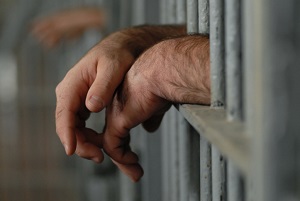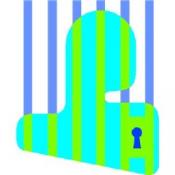 Although jail time might seem like a distant possibility for most people, incarceration rates in the United States are steadily rising. One study published in the journal Pediatrics found that 41% of young adults have been arrested by the time they are 23. The U.S. Department of Justice (DOJ) reports that 6.6% of people serve time in prison at some point in their lives, and the statistic rises to a shocking 32% for African-American men. More than half of inmates are diagnosed with a mental health disorder.
Although jail time might seem like a distant possibility for most people, incarceration rates in the United States are steadily rising. One study published in the journal Pediatrics found that 41% of young adults have been arrested by the time they are 23. The U.S. Department of Justice (DOJ) reports that 6.6% of people serve time in prison at some point in their lives, and the statistic rises to a shocking 32% for African-American men. More than half of inmates are diagnosed with a mental health disorder.
As state mental hospitals continue to close and mental health services remain financially out of reach for many people, this number may rise. Moreover, prison itself can exacerbate preexisting mental health issues and create new mental health challenges among those who had never experienced them.
Mental Health Care Behind Bars
Jails and prisons are required to provide basic health care for inmates, but the quality of this care varies greatly. Often, prison-based mental health care focuses on stabilizing, rather than treating, inmates. A person experiencing hallucinations or psychosis might get medication to control the most severe symptoms, but people with anxiety issues, depression, posttraumatic stress, and other mental health conditions that don’t cause radical changes in behavior may go untreated. Prisoners rarely, if ever, get therapy or comprehensive treatment, so mental health issues that were previously controlled with medication and therapy may get much worse during incarceration.
Prison and Trauma
Even for the most hardened criminals, prison can be a scary place. The DOJ reports that 70,000 prisoners are sexually abused every year, and assaults, fights, and other acts of violence are common in a prison setting. But violence isn’t limited to inmates; prison guards work in a high-stress environment that can increase their likelihood of becoming violent. With little hope for reporting abuse by guards, some inmates may endure verbal abuse, threats of physical violence, and even severe attacks. Women inmates are at an increased risk of being sexually assaulted by jail and prison guards. This ongoing climate of trauma can create anxiety, depression, phobias, and PTSD in prisoners who previously had no serious mental health issues.
Lack of Support
Prisoners are, by definition, cut off from the rest of society, and their access to supportive friends and family may be limited. Many jails have instituted mail policies prohibiting letters and magazine subscriptions, and these policies can eliminate prisoners’ ability to communicate with and receive support from loved ones. Phone calls from jail can be costly, and prisoners from impoverished backgrounds may have families who can’t afford to cover the costs of collect calls, however infrequent. There’s little hope for getting any support in prison, as many prisoners are concerned more with gaining respect and avoiding fights in a relentless pursuit of safety. Support from loved ones can play a critical role in helping people overcome mental challenges, and isolation can increase a person’s risk of mental health issues such as depression and anxiety.
Getting Out
Most prisoners have ignored basic rules of society, so it can be difficult for prisoner rights issues to garner much public sympathy. But many prisoners are incarcerated for nonviolent drug crimes that are the result of substance addiction. And even inmates incarcerated for violent crimes do not typically serve life sentences. Most prisoners are ultimately released, and the mental health issues they develop in prison can increase their risk of reoffending and make it difficult to reenter society as a productive, nonthreatening citizen. Almost 70% of people who have been incarcerated are arrested again within three years, and the dire state of mental health care in prisons could play a significant role in this high rate of recidivism.
A mental health professional can help people who have come into contact with the prison system. A therapist can help prisoners reenter society or reestablish bonds with friends and family. Loved ones of incarcerated individuals can also get necessary emotional support in therapy. Therapy is a safe and confidential place for any and all people to get help.
References:
- Chaddock, G. R. (2003, August 18). US notches world’s highest incarceration rate. The Christian Science Monitor. Retrieved from http://www.csmonitor.com/2003/0818/p02s01-usju.html
- Gann, C. (2011, December 19). Study: Significant number of young Americans get arrested. ABC News. Retrieved from http://abcnews.go.com/Health/arrests-increasing-us-youth/story?id=15180222
- James, D. J., & Glaze, L. E. (2006, December 14). Mental health problems of prison and jail inmates [PDF]. Washington, D.C.: U.S. Department of Justice Bureau of Justice Statistics.
- Purdy, M. (1995, December 19). Brutality behind bars. The New York Times. Retrieved from http://www.nytimes.com/1995/12/19/nyregion/brutality-behind-bars-special-report-prison-s-violent-culture-enveloping-its.html?pagewanted=all
- Recidivism. (n.d.). Bureau of Justice Statistics (BJS). Retrieved from http://bjs.ojp.usdoj.gov/index.cfm?ty=tp
- Sakala, L. (2013, February 7). Return to sender: Postcard-only mail policies in jails. Prison Policy Initiative. Retrieved from http://www.prisonpolicy.org/postcards/report.html
- U.S.: Federal justie statistics show widespread prison rape. (2007, December 16). Human Rights Watch. Retrieved from http://www.hrw.org/news/2007/12/15/us-federal-statistics-show-widespread-prison-rape
- U.S.: Number of mentally ill in prisons quadrupled. (2006, September 6). Human Rights Watch. Retrieved from http://www.hrw.org/news/2006/09/05/us-number-mentally-ill-prisons-quadrupled

The preceding article was solely written by the author named above. Any views and opinions expressed are not necessarily shared by GoodTherapy.org. Questions or concerns about the preceding article can be directed to the author or posted as a comment below.

 Examining Solitary Confinement and Its Effects on Mental Health
Examining Solitary Confinement and Its Effects on Mental Health When People Are Mandated to Treatment
When People Are Mandated to Treatment Prisoners in the Home: How Agoraphobia Can Radically Alter Life
Prisoners in the Home: How Agoraphobia Can Radically Alter Life

Please fill out all required fields to submit your message.
Invalid Email Address.
Please confirm that you are human.
Leave a Comment
By commenting you acknowledge acceptance of GoodTherapy.org's Terms and Conditions of Use.